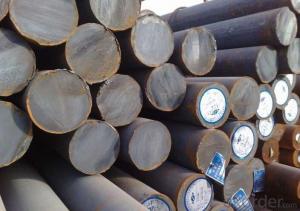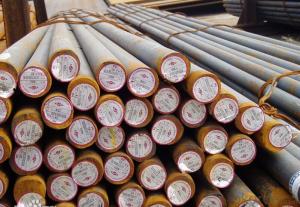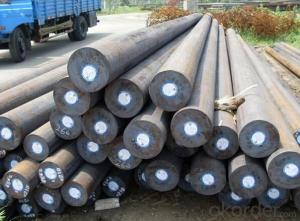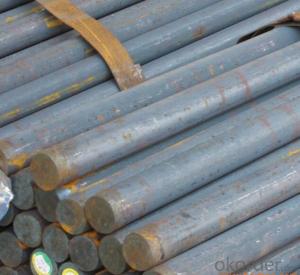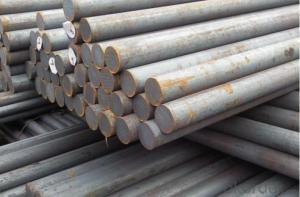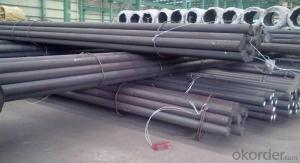aisi high strength carbon alloy steel bars
- Loading Port:
- China main port
- Payment Terms:
- TT OR LC
- Min Order Qty:
- 3 m.t.
- Supply Capability:
- 100000 m.t./month
OKorder Service Pledge
OKorder Financial Service
You Might Also Like
Item specifice
Shape: Round Bar/Square Bar/Flat Bar/Plate/Wire
Standard: GB/ASTM/SAE/AISI/DIN/JIS/EN/BS
Surface Treatment: Black/Peeling/Polished/Machined
Delivery Condition: Hot Rolled or Forged/Peeled or Black Surface
Test: SGS/UT 100% Elements Testing
Certificate: ISO/Mill Certificate
Service: 24 hours online server more than 20 years trading and manufacture
Quality Assurance: the third party inspection, such as SGS, BV, TUV…etc. is acceptable
Packaging Details: Seaworthy Packaging or as per customer's packing instruction
Are you a trading company or manufacturer? Manufacturer
What’s the MOQ? 3 metric ton
What’s your delivery time? 15-35 days after downpayment received
what’s your delivery terms? FOB/CFR/CIF
What's the Payment Terms? 30% as deposit,70% before shipment by T/T
Western Union acceptable for small amount.
L/C acceptable for large amount.
Scrow ,Paybal,Alipay are also ok
Why choose us? Chose happens because of quality, then price, We can give you both.
Additionally, we can also offer professional products inquiry, products knowledge train (for agents), smooth goods delivery, excellent customer solution proposals.
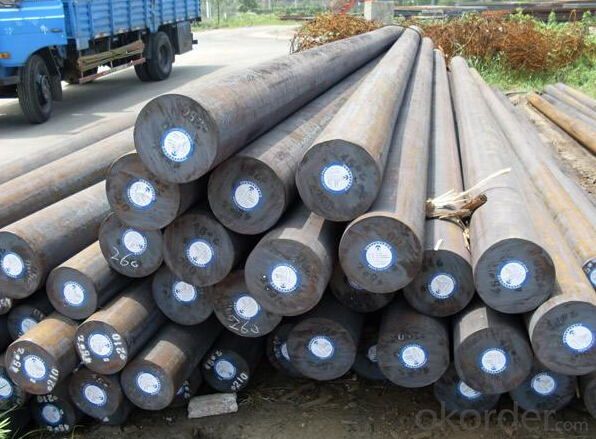
- Q:What is the role of cobalt in special steel?
- Cobalt plays a crucial role in special steel as it acts as a stabilizing element, improving the steel's strength, toughness, and resistance to corrosion and wear. It also helps in retaining the steel's magnetic properties, making it suitable for applications in the aerospace, automotive, and energy sectors.
- Q:What are the different methods for improving the fatigue strength of special steel?
- There are several methods for improving the fatigue strength of special steel. 1. Heat treatment: One of the most common methods is through heat treatment processes such as annealing, quenching, and tempering. These processes help to refine the microstructure of the steel, reducing the presence of impurities, and improving its fatigue resistance. 2. Surface treatment: Surface treatments like shot peening and nitriding can enhance the fatigue strength of special steel. Shot peening involves bombarding the surface of the steel with tiny metal particles, inducing compression stress in the material, which helps to prevent crack initiation and propagation. Nitriding involves diffusing nitrogen into the surface layer of the steel, forming a hard and wear-resistant nitride layer that enhances the fatigue resistance. 3. Alloying: Alloying special steel with certain elements can significantly improve its fatigue strength. For example, adding chromium, molybdenum, or vanadium can enhance the steel's hardenability and resistance to fatigue. These alloying elements form carbides or nitrides, which act as barriers to crack propagation. 4. Surface coatings: Applying protective coatings like electroplating, hot-dip galvanizing, or physical vapor deposition (PVD) can help improve the fatigue strength. These coatings provide a barrier against environmental factors that may lead to corrosion or surface damage, ultimately enhancing the fatigue life of the steel. 5. Grain refinement: By refining the grain size of the steel through processes like severe plastic deformation or equal channel angular pressing (ECAP), the fatigue strength can be improved. Fine-grained steels have a higher resistance to crack initiation and propagation, resulting in enhanced fatigue properties. 6. Residual stress management: Controlling and managing residual stresses in the steel can improve its fatigue strength. Techniques like stress relieving or shot peening can help to reduce tensile residual stresses, which are detrimental to fatigue resistance. It is important to note that the selection of the most appropriate method for improving fatigue strength depends on the specific requirements, the type of special steel, and the intended application of the material.
- Q:How does surface treatment affect the performance of special steel?
- Surface treatment plays a crucial role in enhancing the performance of special steel. The primary purpose of surface treatment is to alter the surface properties of the steel to meet specific requirements and improve its performance in various applications. One significant effect of surface treatment on special steel is increased corrosion resistance. By applying coatings or treatments such as galvanization, electroplating, or passivation, the steel's surface becomes more resistant to the damaging effects of moisture, chemicals, and other corrosive agents. This is particularly important in industries like construction, automotive, or marine, where steel is exposed to harsh environments. Surface treatment also affects the wear resistance of special steel. Through processes like carburizing, nitriding, or boriding, a thin layer of hard and wear-resistant material is formed on the steel's surface. This significantly improves its ability to withstand friction, abrasion, and mechanical stress, making it suitable for applications involving heavy machinery, cutting tools, or bearings. Furthermore, surface treatment can enhance the aesthetic appeal of special steel. Techniques like polishing, grinding, or coating can improve the steel's appearance, making it more visually appealing for architectural or decorative purposes. Another important aspect affected by surface treatment is the steel's adhesion properties. By modifying the surface through processes such as shot peening or surface etching, the steel becomes more receptive to adhesives, paints, or coatings. This improves the bond strength between the steel and other materials, making it suitable for applications where adhesion is critical, such as in aerospace or electronics industries. In summary, surface treatment significantly impacts the performance of special steel. It enhances corrosion resistance, wear resistance, adhesion properties, and aesthetic appeal. By selecting the appropriate surface treatment techniques, manufacturers can tailor the steel's surface properties to meet specific application requirements, thereby maximizing its performance and extending its lifespan.
- Q:How does special steel contribute to the mining aftermarket industry?
- Special steel contributes to the mining aftermarket industry by providing high-strength and durable materials for various mining equipment and machinery. It enhances the performance and longevity of mining components such as drill bits, conveyor belts, crushers, and cutting tools. The use of special steel in these applications improves productivity, reduces downtime, and lowers maintenance costs, thus playing a crucial role in the efficiency and profitability of the mining aftermarket industry.
- Q:What are the properties of wear-resistant stainless steel?
- Wear-resistant stainless steel has several properties that make it highly effective in resisting wear and tear. Firstly, it has a high hardness level, which allows it to withstand abrasive forces and maintain its shape under heavy loads. Additionally, it exhibits excellent corrosion resistance, preventing rust or degradation even in harsh environments. This type of stainless steel also possesses good impact resistance, meaning it can withstand sudden impacts without cracking or breaking. Furthermore, wear-resistant stainless steel typically has a low coefficient of friction, reducing frictional forces and minimizing wear when in contact with other materials. Overall, these properties make wear-resistant stainless steel a durable and reliable choice for applications where wear and tear are major concerns.
- Q:Can special steel be used for making aerospace components?
- Indeed, aerospace components can be manufactured using special steel. Also referred to as aerospace steel or aircraft steel, this specific type of steel is meticulously designed to meet the rigorous demands and strict requirements of the aerospace sector. It possesses outstanding properties such as exceptional strength, durability, and heat resistance, all of which are vital for enduring the extreme conditions faced by aircraft components during flight. Aerospace components, including landing gear, engine parts, fasteners, and structural elements, often necessitate materials that can maintain their integrity even when subjected to high temperatures, stress, and corrosive environments. Special steel alloys are developed to possess excellent mechanical properties, such as high tensile strength, fracture toughness, and resistance to fatigue, creep, and corrosion. These properties render them suitable for crucial aerospace applications where safety and reliability are of the utmost importance. Furthermore, special steel can be customized to meet specific requirements, such as weight reduction, improved fuel efficiency, and enhanced performance. By employing advanced alloying techniques and heat treatments, aerospace steel can be engineered to possess desirable characteristics like increased hardness, wear resistance, and dimensional stability. This enables the production of lighter and more efficient aerospace components without compromising on strength or safety. In conclusion, special steel stands out as the preferred material for manufacturing aerospace components due to its exceptional mechanical properties, heat resistance, and corrosion resistance. Its ability to withstand extreme conditions and be tailored to specific requirements makes it an ideal choice for producing critical parts used in the aerospace industry.
- Q:What are the main factors affecting the impact toughness of special steel?
- The impact toughness of special steel, or any material for that matter, is influenced by various factors. Some of the main factors affecting the impact toughness of special steel are: 1. Composition: The chemical composition of the steel plays a significant role in determining its impact toughness. Elements such as carbon, manganese, silicon, nickel, and molybdenum can be added to enhance the toughness of the steel. Higher carbon content generally improves hardness but reduces toughness, while alloying elements like nickel and molybdenum can enhance toughness. 2. Heat treatment: The heat treatment process, including processes like quenching and tempering, can significantly affect the impact toughness of special steel. Proper heat treatment can refine the microstructure of the steel, making it more resistant to fractures and increasing its toughness. 3. Microstructure: The microstructure of the steel, including the size, shape, and distribution of its grains, greatly impacts its toughness. Fine-grained steels generally exhibit better toughness compared to coarse-grained ones. The presence of certain phases, such as martensite or bainite, can also affect the impact toughness. 4. Inclusions: The presence of non-metallic inclusions, such as sulfides, oxides, or carbides, in the steel can act as stress concentration points and reduce its impact toughness. High-quality special steels often undergo processes like vacuum degassing or electroslag remelting to minimize the presence of these inclusions. 5. Processing conditions: The manufacturing processes used to produce special steel can influence its impact toughness. Factors such as forging, rolling, or extrusion conditions, as well as the cooling rate during solidification, can affect the microstructure and, consequently, the toughness of the steel. 6. Temperature: The impact toughness of special steel also varies with temperature. Some steels exhibit good toughness at low temperatures, while others may have better performance at higher temperatures. The temperature at which the steel is used or tested is an important factor to consider when evaluating its impact toughness. It is worth noting that the impact toughness of special steel is often determined using standardized tests, such as the Charpy or Izod test, which involve subjecting a notched specimen to impact loading. These tests provide valuable information on the material's ability to absorb energy and resist fracture under impact conditions.
- Q:How does special steel perform in cryogenic toughness?
- Special steel performs well in cryogenic toughness due to its unique composition and manufacturing processes. It is specifically designed to maintain its strength, hardness, and toughness even at extremely low temperatures. This makes it highly resistant to brittle fracture and ensures reliable performance in cryogenic applications, such as liquefied natural gas (LNG) storage tanks, aerospace components, and superconducting magnets.
- Q:How does special steel perform in terms of machinability?
- Special steel typically performs well in terms of machinability. It is specially designed to have improved cutting, drilling, and shaping properties, making it easier to work with using various machining processes. Special steel often has a more consistent composition and structure, which results in reduced tool wear, better surface finish, and increased productivity during machining operations.
- Q:What are the requirements for special steel used in wind turbines?
- The requirements for special steel used in wind turbines typically include high strength and durability, resistance to corrosion and fatigue, excellent weldability, and good magnetic properties. Additionally, the steel should possess good formability and machinability to aid in the manufacturing process of turbine components.
1. Manufacturer Overview |
|
|---|---|
| Location | |
| Year Established | |
| Annual Output Value | |
| Main Markets | |
| Company Certifications | |
2. Manufacturer Certificates |
|
|---|---|
| a) Certification Name | |
| Range | |
| Reference | |
| Validity Period | |
3. Manufacturer Capability |
|
|---|---|
| a)Trade Capacity | |
| Nearest Port | |
| Export Percentage | |
| No.of Employees in Trade Department | |
| Language Spoken: | |
| b)Factory Information | |
| Factory Size: | |
| No. of Production Lines | |
| Contract Manufacturing | |
| Product Price Range | |
Send your message to us
aisi high strength carbon alloy steel bars
- Loading Port:
- China main port
- Payment Terms:
- TT OR LC
- Min Order Qty:
- 3 m.t.
- Supply Capability:
- 100000 m.t./month
OKorder Service Pledge
OKorder Financial Service
Similar products
New products
Hot products
Related keywords
